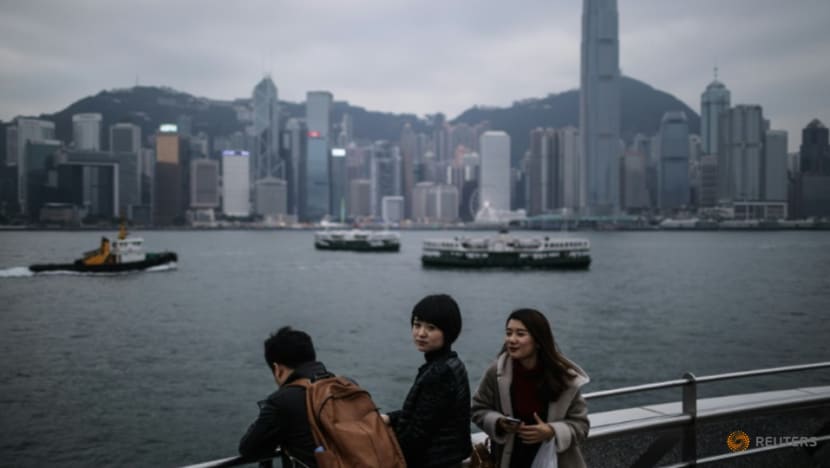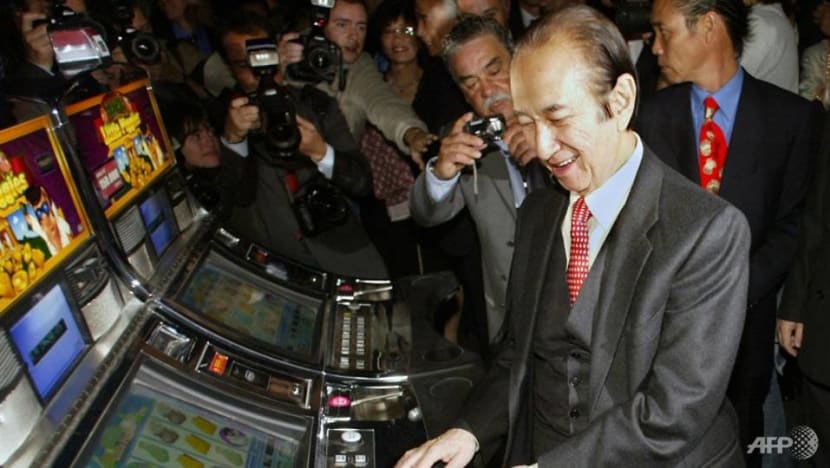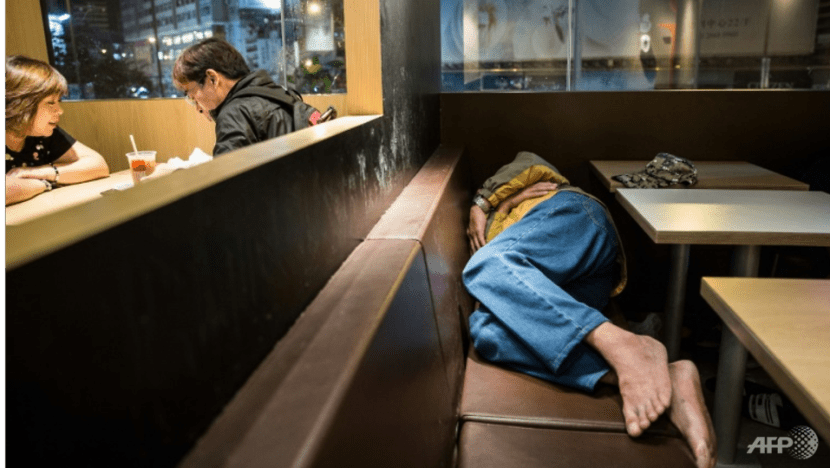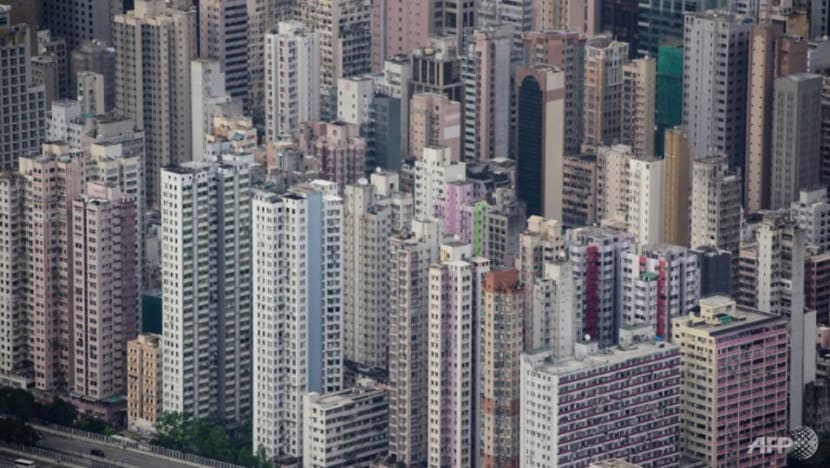commentary Commentary
Commentary: A spirit of pessimism hovers over Hong Kong, one of the least happy places in the world
What is behind Hong Kong’s infamous reputation as one of the world’s unhappiest places? China commentator Tom McGregor takes a deep dive into the Pearl of the Orient.

Hong Kong marked 20 years since it was handed over to China on Jul 1, 2017. (Photo: AFP/Dale De La Rey)
BEIJING: For a number of decades, Hong Kong stood tall as a major financial hub in Asia, home to the Hong Kong Stock Exchange, a regional banking centre and a gateway to mainland China markets.
But the local economy has staggered in recent years, while even new age yoga gurus are fleeing the city in search of greener pastures elsewhere.
The city was ranked the seventh least happy place in the world in 2017, according to US-based research organisation Gallup International.
‘IN HONG KONG, LIFE IS ABSOLUTELY HORRIBLE’
The South China Morning Post quoted British writer Rajeev Balasubramanyam, who recounted his life in Hong Kong from 2009 to 2012, saying that:
People come to Hong Kong for one reason. To make money. And everyone is unhappy. It is one of the unhappiest places I have been to.
He has raised some pressing concerns about whether those in Hong Kong may be feeling more pessimistic about the future and more pressured to keep up with a rapidly accelerating pace of life, something that is felt both by the young and old, rich and poor:
I talked to students and young people who are doing what their parents tell them and don’t want to do it. For old people, if you are poor in Hong Kong, life is absolutely horrible. If you are rich, there is not much to do other than eat and shop. It’s quite empty.
The city of Hong Kong, once a sterling example of a meritocratic system, had so long prospered allowing many local families to rise above their humble circumstances to achieve great fortunes and build sprawling business empires across Asia - including those founded by magnate Li Ka Shing, gaming scion Stanley Ho and Logan Property chairman Kei Hoi Pang.

Even as the economy soared over the last few decades, the Hong Kong market is slowly adjusting to new realities, amid swelling property prices and rising costs of living that has outpaced salary and economic growth in recent years.
Hong Kong property prices have surged so much, only the very wealthy can purchase apartments that are spacious, comfortable and well-located.
PESSIMISM LURKS AMONG HONG KONG YOUTHS
So many young people across the world have aspirations to get ahead in life and gain career success, but youths in Hong Kong are increasingly sceptical that can be achieved.
One in three suffer from stress, anxiety or depression, a survey last year showed, and a third aged 10 to 14 are at risk of suicide.
Those who try to carve out a life for themselves are forced to rent apartments that are either too small or require them to share cramped spaces with other renters.
Just imagine for a moment you are a young Hong Kong graduate from one of the most prestigious universities in the city. Chances are, you are working a “996” job, from 9am to 9pm, six days a week at an office.
How did you get there? And what happened to your social life?
READ: How instant noodles became a symbol of workaholics everywhere, a commentary
READ: China's protest against long working hours is so old-fashioned, a commentary
Those employed in such demanding careers cannot simply say “no” and seek another job.
They are all too likely to be labelled “a quitter” by the close-knit and gossip-prone local business community, with all-too-real, knock-on ramifications on their professional prospects, which when exacerbated with sky-high rents, runs them the risk of homelessness and ostracisation by family members.

READ: The invisibility of the poor in Crazy Rich Hong Kong, a commentary
Thirty-five per cent of all those who sleep on the streets have jobs, according to the Homeless Outreach Population Estimation study.
To make matters worse, Hong Kong faces a severe housing crisis and it’s getting worse. In the city’s Kwun Tong district, 57,000 people are crowded into every sq km of land, according to statistics released by Hong Kong authorities. Compare that to New York City’s density - 7,000 people per sq km.
Young singles aspiring to get married will be in for a rude shock when the bill to tie the knot has averaged HK$419,500 (US$46,000) for a 100-guest dinner. So it’s no wonder many Chinese are known to say that the most stressful times of their lives are when they get married.
The groom and his family are expected to pay for a dowry, a home and a wedding, and it is common to hear stories of the groom’s family taking out large loans, knowing that it will take many years for them to pay everything back.
Is it any surprise then that Hong Kong fares low on happiness? And did I mention the poll at the start scored Hong Kong low based on how respondents feel about how optimistic they are of the city’s future?
READ: Closing the umbrella? The verdict on democracy in Hong Kong, a commentary

A CORROSIVE PRESSURE TO DO WELL
It is worth pointing out that Hong Kong does have strong fundamentals that make it an attractive destination, one reason why many highly mobile professionals continue to flock to the Pearl of the Orient.
A high quality of life, a strong judiciary, and a competent administration make it a well-run system.
But the pressure to do well and the constant reminders of the risks of falling behind at a young age are breeding a corrosive environment for many Hong Kong youths.
Soaring inequality, the second-highest in the world by some measures, coupled with stagnating salaries for fresh graduates in recent years, are also starting to erode the city’s work ethic, a crucial ingredient that once propelled it into the ranks of the developed world.
READ: Single women may be driving gentrification in Hong Kong, a commentary
There are now 10,000 ultra-rich people worth at least S$30 million in Hong Kong, a number that has grown by almost one third over 2017 alone, and the wealthier and well-heeled do not shy away from flaunting their lavish lifestyles.
Hong Kong’s recent economic growth slowdown is also placing residents in a bind as they no longer enjoy the prosperity they have long been accustomed to.
The city expanded at its slowest pace in two years, amid a brewing US-China trade war, Hong Kong finance chief Paul Chan said in February, adding that he expects growth in 2019 to be lower than the decade’s average.
READ: A vanishing century-old tea house in Hong Kong, as heritage gives way to wealth, a commentary
As Hong Kong begins to fade into the sunset, some Hong Kong youths are starting to look at the promising, rapidly urbanising cities in the mainland for a better life, including nearby Shenzhen and Shanghai.
The bustling city of Hong Kong is losing its lustre. The winners of this emerging malaise may be mainland cities, which are fast becoming vibrant centres of innovation, business and creativity as growing financial hubs for China and Northeast Asia.
Tom McGregor is a commentator on Asia-Pacific affairs based in Beijing.












